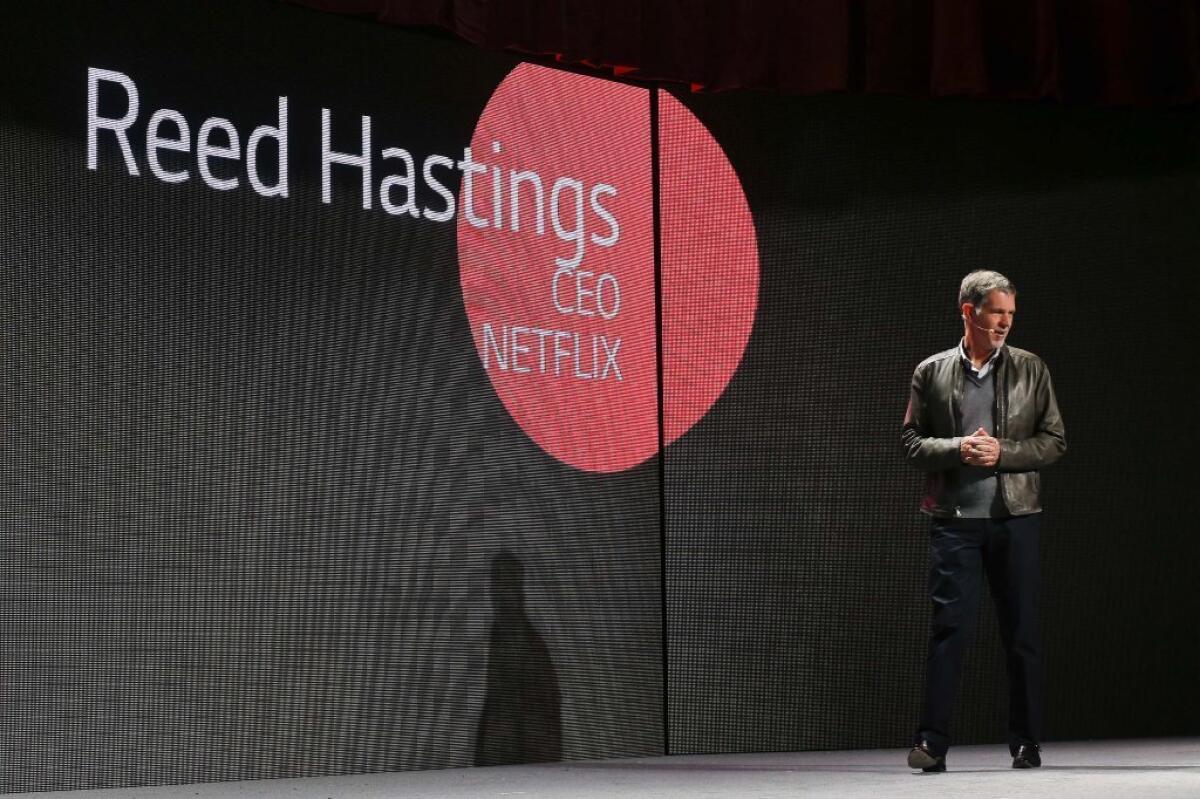Will Netflix be the savior of net neutrality? Or a fifth column?

Netflix, feeling fat and happy from a great year -- 44 million members at the end of 2013, up 33% from a year earlier -- threw down the gauntlet to Internet service providers who may be plotting to throttle its video streams. As we reported earlier, ISPs were all but given the green light by a federal court to discriminate among online sources. That’s a mortal threat to the principle of the open Internet and net neutrality.
Netflix, which has 33 million subscribers in the U.S., is right to assume that the court ruling is a dagger pointed right at its heart. But it’s ready to fight. In his year-end letter to shareholders, Chief Executive Reed Hastings warned that the company is prepared to call for “more regulation” if it catches ISPs discriminating.
Since it accounts for nearly a third of all Internet download traffic in North America, Netflix is a rich target for ISPs that want to squeeze it for fees to carry that traffic unimpeded. Alternatively, it’s a rich target for ISPs that want to sell their own video services to their own subscribers, and therefore have an incentive to degrade the Netflix signal to gain a competitive edge.
Hastings isn’t having any of that. If ISPs violate the principle of “strong network neutrality across all networks, including wireless ... we would vigorously protest and encourage our members to demand the open Internet they are paying their ISP to deliver.”
That may not sound like a strong position on the surface, but actually it’s a threat to muster a pitchfork-wielding mob, 33 million strong, marching on Congress and the FCC on behalf of net neutrality. Nor is it the only big player with an evident interest in net neutrality: The second biggest source of Web traffic is YouTube, which accounts for more than 17% and is owned by Google -- not your typical modest, self-effacing corporation.
These companies, and others with an interest in reaching their subscribers and users without interference, could become an effective counterweight against Comcast, Verizon (which brought the lawsuit on which the federal court ruled on Jan. 14), and other ISPs. That’s important because the net neutrality battle will have to be decided by Congress or the Federal Communications Commission. If Comcast and Verizon are going to be on one side, it’s comforting to have Netflix and Google on the other.
Or is it? There is a danger in the public interest’s being safeguarded by big companies with commercial interests of their own. The two interests may not exactly coincide. Netflix and Google, reliant on clean Internet traffic as they are, are also big enough to pay for the privilege -- with the collateral benefit of jumping ahead of their own competitors. In other words, they may be comfortable with a world in which ISPs are free to discriminate -- as long as the discrimination is for them.
That’s the drawback of AT&T’s recently announced “sponsored data” program, which charges content providers for the traffic they’re sending to mobile users. (The sponsored data aren’t charged against the users’ data plans.) Netflix and Google may find it advantageous to pay the freight -- and they’ll probably find a way to stick their own customers with the bill -- but the program may freeze out smaller firms or startups without the wherewithal to pay their own way.
As Harold Feld of the consumer advocacy group Public Knowledge observes, the recent court decision means that the FCC still has the authority to find that AT&T’s program violates existing Internet carriage rules and order it stopped, but can’t stop such a program in advance.
The result is sure to be confusion in the marketplace, and that’s an environment in which the big guys can strengthen their own positions and implement new and innovative ideas to soak the ultimate customers, you and me. So while there is some benefit in having Netflix and Google playing on the net neutrality team, that’s still not as good as having Congress and the FCC there. And it’s not at all clear that Congress and the FCC are on the customers’ side.
More to Read
The biggest entertainment stories
Get our big stories about Hollywood, film, television, music, arts, culture and more right in your inbox as soon as they publish.
You may occasionally receive promotional content from the Los Angeles Times.







